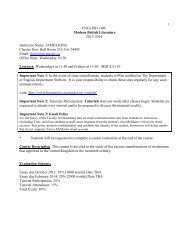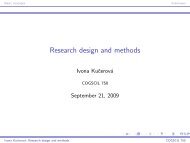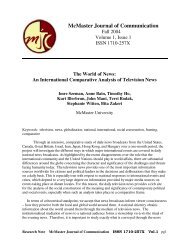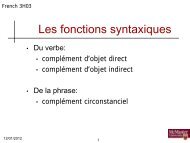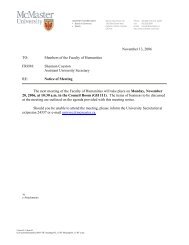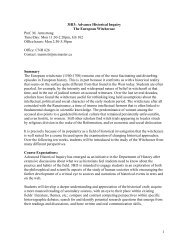The Syntax of Givenness Ivona Kucerová
The Syntax of Givenness Ivona Kucerová
The Syntax of Givenness Ivona Kucerová
You also want an ePaper? Increase the reach of your titles
YUMPU automatically turns print PDFs into web optimized ePapers that Google loves.
To sum up, we now have in place a formal system which can account both for syntax<br />
and semantics <strong>of</strong> givenness in Czech. In the following sections, I will address two remaining<br />
questions: First, what is the relation between givenness and deaccenting in English?<br />
Second, what is the role <strong>of</strong> phonology in the overall system?<br />
4.6 <strong>Givenness</strong> versus deaccentuation<br />
In the literature on givenness there is disagreement on how to define the exact semantic<br />
properties <strong>of</strong> givenness. 19 I have not addressed so far the question <strong>of</strong> how G-movement<br />
stands with respect to the conditions on givenness assumed for other languages. Since the<br />
literature on givenness is vast I will concentrate here on literature which explicitly argues<br />
for a direct relation between deaccentuation in English and givenness. This is a reasonable<br />
move because the literature arguing for givenness as the default information structure value<br />
(Schwarzschild, 1999; Krifka, 2001; Sauerland, 2005, among others) is based on the claim<br />
that an empirically more accurate theory <strong>of</strong> English prosody can be built if focus accenting<br />
is eliminated in favor <strong>of</strong> deaccenting given constituents. 20<br />
I will show in this section that the conditions on deaccenting are weaker than the conditions<br />
on G-movement. In other words, not everything that gets deaccented in English,<br />
G-moves in Czech. I will argue that for a Czech constituent α to be given and be able to<br />
G-move two conditions must be satisfied: (i) α must have a salient (contextually entailed)<br />
antecedent, and (ii) there must be an existential presupposition which α satisfies. On the<br />
other hand, in English, for an element to be deaccented it is enough that the element has<br />
a salient antecedent. <strong>The</strong> main argument will be based on the behavior <strong>of</strong> indefinites in<br />
Czech.<br />
Let’s start with Schwarzschild’s informal definition <strong>of</strong> givenness, in (114).<br />
(114) Definition <strong>of</strong> GIVEN (Schwarzschild 1999, p. 151, (25))<br />
An utterance U counts as GIVEN iff it has a salient antecedent A and<br />
a. if U is type e, then A and U corefer;<br />
b. otherwise: modulo ∃–type shifting, A entails the Existential F-closure <strong>of</strong> U.<br />
<strong>The</strong> question that arises is what it exactly means to have a salient antecedent. Consider the<br />
following English examples and the parallel Czech examples.<br />
(115) (Schwarzschild, 1999, p. 154, ex. (30))<br />
If a MAN owns a DONKEY, his WIFE owns a donkey.<br />
(116) a. Když muž vlastní OSLA, jeho žena vlastní OSLA.<br />
when man owns donkey his wife owns donkey<br />
‘If a man owns a donkey, his wife owns a donkey.’<br />
19 I thank Irene Heim for discussing the facts in this section with me and for helping me sort them out.<br />
20 But see Krifka (2006a) and Krifka (2006b) for arguments that not everything can be captured with a<br />
givenness-only theory.<br />
123



